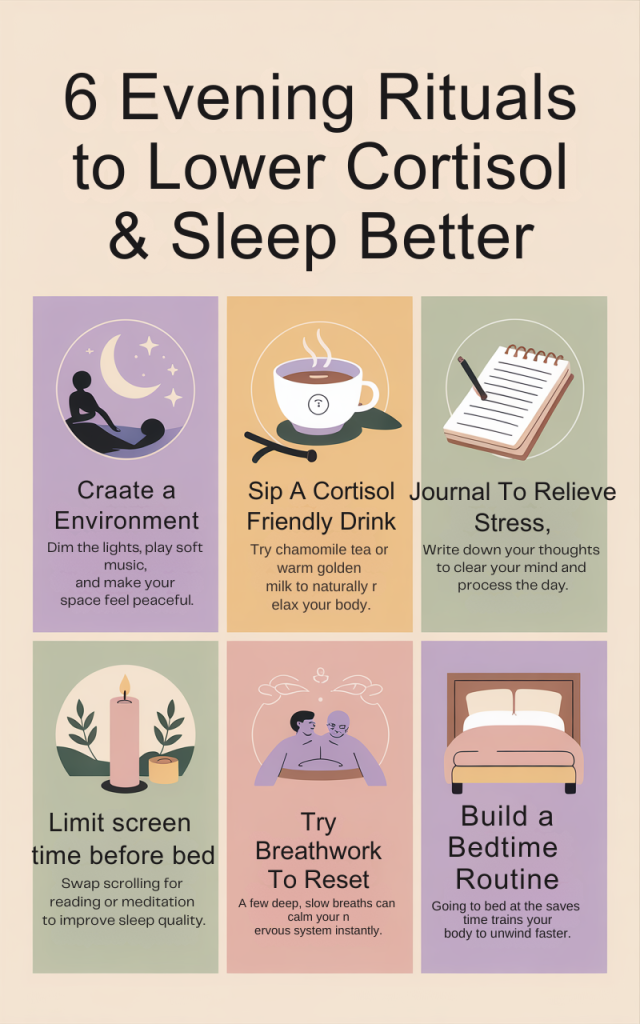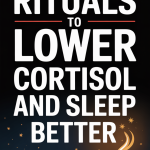5 Evening Rituals to Lower Cortisol and Sleep Better
If you’ve been lying awake at night replaying your to-do list or waking up at 3 a.m. for no reason, high cortisol levels might be to blame. Cortisol — your body’s main stress hormone — is naturally higher in the morning to wake you up, but if it stays elevated into the evening, it can wreck your sleep, spike anxiety, and mess with your hormones.
The good news? You can train your body to wind down and reset your stress response. These five evening rituals can help lower cortisol naturally so you fall asleep faster and wake up refreshed.
1. Create a “Cortisol-Friendly” Evening Environment
Your body takes cues from your surroundings. Bright lights, late-night scrolling, and overstimulating TV shows trick your brain into thinking it’s still daytime, keeping cortisol high and melatonin low.
How to fix it:
- Dim the lights 1–2 hours before bed. Warm, soft lighting tells your body it’s time to relax.
- Ditch screens at least 30 minutes before sleep — or use blue-light blocking glasses if you must.
- Set the vibe: Try candles, soft music, or lavender essential oil to trigger your parasympathetic “rest and digest” mode.
Pro tip: Keeping your bedroom around 65–68°F also signals to your body that it’s time to rest.
2. Try a 5-Minute “Stress Dump” Journal
Racing thoughts keep cortisol elevated, even when you’re physically tired. A quick journaling ritual helps you “offload” stress before bed so your brain doesn’t keep processing it overnight.
What to write:
- Everything that’s on your mind — no filter, no structure
- Tomorrow’s top 3 priorities
- One thing you’re grateful for
This simple practice tells your brain: we’ve handled it, you can relax now.

3. Sip a Cortisol-Calming Drink
What you drink before bed matters. Caffeine, alcohol, and sugary drinks can all spike cortisol and disrupt sleep. Instead, go for calming, cortisol-friendly options:
- Chamomile tea → boosts GABA for relaxation
- Warm tart cherry juice → naturally supports melatonin production
- Golden milk → turmeric, ginger, and cinnamon lower inflammation and stress hormones
Keep it caffeine-free after 2 p.m. and avoid heavy nightcaps — alcohol may make you drowsy but disrupts deep sleep cycles.
4. Use Breathwork to Reset Your Nervous System
One of the fastest ways to lower cortisol is to flip your nervous system from “fight or flight” to “rest and digest.” Breathwork triggers the vagus nerve, calming your body and preparing you for sleep.
Try this 4-7-8 breathing technique:
- Inhale through your nose for 4 seconds
- Hold your breath for 7 seconds
- Exhale slowly through your mouth for 8 seconds
- Repeat for 4–6 cycles
Within minutes, your heart rate slows, blood pressure drops, and your body eases into sleep mode.
5. Build a Consistent Wind-Down Routine
Your body thrives on rhythm. Going to bed at wildly different times confuses your circadian clock, keeping cortisol elevated when it should be falling.
Your goal: Create a predictable, relaxing ritual you repeat every night. Examples:
- 10 minutes of light stretching or yoga
- A warm shower or Epsom salt bath
- Listening to calming music or white noise
- Reading a physical book under soft lighting
The more consistent you are, the faster your body learns when to “power down.”
The Bottom Line
High evening cortisol is one of the biggest culprits behind restless nights and groggy mornings — but it’s not permanent. By setting up calming rituals, dimming your environment, breathing deeply, and syncing with your natural circadian rhythm, you can lower stress and finally get the deep, restorative sleep your body needs.






